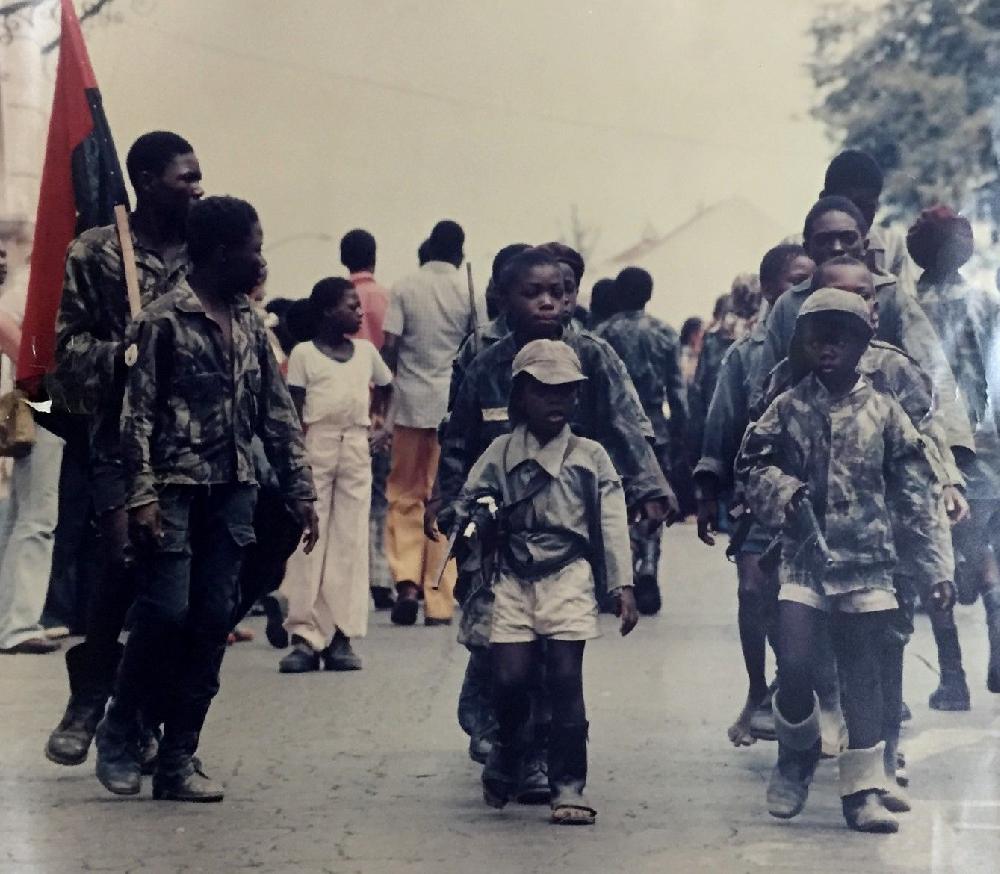
Angolan History: Independence--MPLA Control (1975-88)

Figure 1.--This press photo came without any provenance. The flag, however tells us that it is pro-MPLA Angolan. More interestingly it originates with Anarcho-Syndicalism, a socialist group so radical that evem Lenin and the Bolsheciks suppressed it. We would guess it was taken about 1980. At the time it was not understood that socialism actually impeded economic growth and the only prpsperous countries have capitalist economies. This commitmet to revolutionary politics and socialist economies was widespread throughout Africa and explains the abject failure throughout thde cointinent of decolonization and the new independent states.
|
|
The Civil War left the MPLA in control of most of the country, but unable to defeat UNITA in the bush. Tbere was moninterest in permiting any diversity or open competuion in governmnt. The Soviet and Cuban connections meant that the only acceptable outcome was a one party dictatorship. Neto declared the MPLA a Marxist-Leninist vanguard party (1975). At the time, many Africans continued believe that Soviet-style communism was the route to rapid economic development. He and the MPLA faced a danting task. Most of the Portuguese settlers left Angola with the Portuguese Army. They ran most of the colonies productive enterpriess, businesses and commercial farms. They were also much of the educated middle class, including doctors, technicians, and teachers. Thus not only was the country's infrastructure destroyed in the war, but the country did not have a trained, educated population to run a modern economy. Neto showed some flexibility in the economic sphere. He permitted private economic activity in commercial and small-scale industry. He also sought economic relations with Western states, a necesity as this is where the market was for Angolan oil and other mineral exports. Even with Cuban support, however, the MPLA was unable to destroy the UNITA guerilla insurgency. And the country was devestated by a combination of the prolonged war and Soviet-style MPLA economic policies. It still was not well understood tht capitalism generated wealth and socialism retarded economic development. The MPLA thought that socilism was the way to a prosperous dveloped economy. Neto died (1979). Josť Eduardo dos Santos, the new MPLA leader, inherited the same difficult economic difficulties that Neto faced. Little progress had been made. Much of the Government's income, mostly oil exports, were used up by the military costs associated with combating the the UNITA insurgency which South Africa continued to support. The MPLA Government for more than a decade continued to be largely dependent on oil exports, Cuban troops, and Soviet-supplied weapons. The Cubans and Soviets were in the incongrous role of defending Western oil interests. In the meantime, Angola made little economic progress. Unlike the Soviets and Cubans, the MPLA did not prohibit private conomic activity, at least at low levels. But no major private activity was possible.
CIH

Navigate the Children in History Website:
[Return to the Main Angolan independence page]
[Return to the Main Angolan history page]
[Return to the Main African history page]
[About Us]
[Introduction]
[Biographies]
[Chronology]
[Climatology]
[Clothing]
[Disease and Health]
[Economics]
[Freedom]
[Geography]
[History]
[Human Nature]
[Ideology]
[Law]
[Nationalism]
[Presidents]
[Religion]
[Royalty]
[Science]
[Social Class]
[Bibliographies]
[Contributions]
[FAQs]
[Glossaries]
[Images]
[Links]
[Registration]
[Tools]
[Children in History Home]
Navigate the Boys' Historical Clothing national pages:
[Return to the Main Angolan page]
[Return to the Main African page]
[Cape Verde Islands]
[Democratic Republic of the Congo]
[Gabon]
[Lessotho]
[Madagascar]
[Mali]
]South Africa]
[Uganda]
[Portugal]
Created: 12:24 AM 7/4/2017
Last updated: 12:24 AM 7/4/2017



